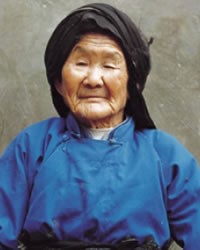Laluo, Mishaba in China

Photo Source:
Copyrighted © 2026
Operation China, Asia Harvest All rights reserved. Used with permission |
Send Joshua Project a map of this people group.
|
| People Name: | Laluo, Mishaba |
| Country: | China |
| 10/40 Window: | Yes |
| Population: | 681,000 |
| World Population: | 681,000 |
| Primary Language: | Lalo, Dongshanba |
| Primary Religion: | Ethnic Religions |
| Christian Adherents: | 0.15 % |
| Evangelicals: | 0.10 % |
| Scripture: | Portions |
| Ministry Resources: | No |
| Jesus Film: | No |
| Audio Recordings: | No |
| People Cluster: | Tibeto-Burman, other |
| Affinity Bloc: | Tibetan-Himalayan Peoples |
| Progress Level: |
|
Introduction / History
The Mishaba Laluo are the largest Western Yi group in China. Until the 1950s, present-day Weishan and Nanjian counties were one administrative unit called Menghua. Since the beginning of the Tang Dynasty (AD 618) Menghua had been inhabited almost exclusively by the Laluo. As a result, the Mishaba Laluo are often called Menghua or Menghuazu by their neighbors. This group could be said to have two self-names in their language: Laluo and Mishaba. Laluo denotes their ethnic identity while Mishaba denotes their regional identity. "This people has, since ancient times, been 'the Laluo from the land of Misha', and, in their hearts, consider themselves as nothing else - certainly not 'Yi'."
Although they had exclusively inhabited the Menghua region since the eighth century, by the start of the Qing Dynasty (1644) the Laluo made up just 70% of the population. Largescale Han migrations to the area during the eighteenth to the twentieth centuries made the Laluo a minority in their homeland and forced many to seek refuge in the mountains for the first time, to retain their culture and identity.
What Are Their Lives Like?
In Weishan County, the Laluo celebrate the Festival of the Tree King on the eighth day of the second lunar month. The entire community gathers around a large tree that stands outside the village. They sacrifice a black piglet, and the pig's front teeth are offered to the spirit of the tree. The rest of the pig is cooked and eaten by the people, who sing a song in praise of the power of the Tree god.
What Are Their Beliefs?
Most of the Mishaba Laluo are animists. On the fifth day of the second lunar month, they hold a ceremony called Calling Back the Spirit of the Rice. A young man dressed in a goatskin is responsible for contacting the spirit. He cracks a whip and shouts toward the hills. If an echo is heard, the spirit is believed to have entered their presence. In one region around Weibao in Weishan County the Mishaba Laluo engage in Daoism, which they inherited from the Chinese centuries ago. Some Laluo have even become Daoist priests.
What Are Their Needs?
The extent of Christianity among the Mishaba Laluo is uncertain, but there are probably a small number of Christians, mostly among assimilated Laluo. Most of this people group, however, have no knowledge of the gospel and no contact with any Christian communities. Traditions keep them together as a people and accepting outside spiritual beliefs is seen as a betrayal of their people.
Prayer Points
Pray for the Holy Spirit to open the Mishaba Laluo hearts to the only one who can save them and provide life to the full.
Pray for the Lord to provide loving workers to the Mishaba Laluo people.